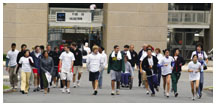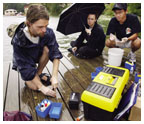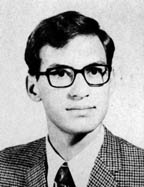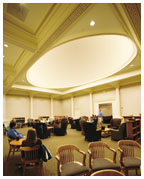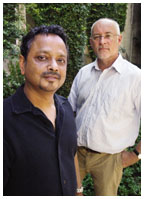
|
|
November 16, 2005: Notebook
For student groups, a month of community service
Alito ’72 nominated for seat on the Supreme Court
Spruced-up
Clio takes on a new role
A ‘totally utopian’ journal of Princeton knowledge
FYI–Findings
The price of patronage
For student groups, a month of community service
Students raised more than $1,600 for local after-school programs in a walkathon Oct. 9. (Beverly Schaefer)
From left, Alistair Boettiger ’07, Meredith Thompson ’08, and Howard Yu ’08 perform chemical tests on water samples taken from Lake Carnegie Oct. 8 near the C. Bernard Shea ’16 Rowing Center. The tests were part of a community cleanup program organized by Princeton Water Watch. (Frank Wojciechowski) |
Walking three miles on a Sunday afternoon, picking up litter on the edge of Lake Carnegie, and pledging an hour of community service for a chance to win the latest iPod. When hundreds of Princeton students take part in activities like these, people notice — and that’s the idea behind the Undergraduate Student Government’s Princeton in the Nation’s Service (PINS) initiative, a month-long program of community engagement.
In October, about 35 student groups partnered with local community organizations for PINS service projects. Individual students chipped in as well, raising more than $1,600 for local after-school programs in a charity walkathon and pledging a total of 125 community service hours in an “auction” for prizes donated by local businesses. In the wake of Hurricane Katrina, PINS expanded its reach beyond the Princeton area, raising more than $23,000 for relief and rebuilding efforts. During fall break, 20 students in the Student Volunteers Council played a more direct role, traveling to Alabama and Louisiana to aid in hurricane cleanup and construction work.
PINS began as a campaign promise by USG President Leslie-Bernard Joseph ’06, who vowed to create a campuswide community service day. The USG’s campus and community affairs committee reworked the idea into a month-long program, with a twist: instead of recruiting individuals, PINS would try to pair existing student groups, particularly nonservice groups such as clubs and athletic teams, with service projects in and around Princeton. The idea, said PINS coordinator Carol Wang ’07, was to enhance the experience of service by having students volunteer with their friends.
Where possible, Wang said, clubs took on projects that matched their interests. Princeton Water Watch led a cleanup at Lake Carnegie and along the Delaware and Raritan Canal; the College Democrats and College Republicans debated national policy at Princeton High School; the men’s and women’s rugby clubs taught their sport to youngsters at the local Boys and Girls Club; and the Organization of Women Leaders volunteered at a shelter for battered women in Ewing.
PINS drew an encouraging turnout, Wang said, but the true test will
be sustaining the projects started in October and repeating the process
next year. Students have busy schedules, and according to Tarik Jones
’07, volunteering with a group you already belong to simplifies
things. Jones, a mechanical and aerospace engineering major, is active
in a half-dozen campus groups, including the Black Student Union’s
Leadership and Mentoring Program (LAMP), which used PINS month to kick
off a new relationship with the Big Sibs program. “I’m glad
to be involved in the community and doing things off campus,” Jones
said with a smile, “instead of having meetings three days a week
on campus.” ![]()
By B.T.

Samual A. Alito ’72’s photo from the Nassau Herald |
Alito ’72 nominated for seat on the Supreme Court
Samuel A. Alito Jr. ’72’s Nassau Herald entry reported that he planned “to go to law school and eventually to warm a seat on the Supreme Court.” Alito headed off to Yale Law School; three decades later, he was nominated Oct. 31 by President Bush to succeed Justice Sandra Day O’Connor.
Referring to the Herald item on the day of his nomination,
Alito said he had “really wanted to be the commissioner of baseball,
and that’s what I should have put down.”
But a classmate wasn’t surprised by the announcement. “If
someone had asked me at the time if Sam would end up on the Court,”
said Roland Frye ’72, who was in ROTC and Whig-Clio with Alito,
“I would have said I wouldn’t put it past him, based on
his temperament, his thoroughness and his intellectual acumen.”
Alito, a Woodrow Wilson School major, was a member of Phi Beta Kappa
and Stevenson Hall, a social alternative to the eating clubs. He also
led the Whig-Clio Debate Panel.
He wrote his thesis on the Italian constitutional court; his adviser,
professor of politics emeritus Walter F. Murphy, said Alito was “probably
the most judicious student I ever had.”
Another classmate, M. Duncan Grant ’72, described Alito as both
“very, very smart” and “genuinely humble.” Noting
the liberal campus politics of the Vietnam War years, Grant said Alito
“was always more conservative than most of us in his outlook,
but never argumentative or doctrinaire about it.”
In his senior year, chairing a Wilson School conference on “The
Boundaries of Privacy in American Society,” Alito wrote a strong
defense of individual privacy against threats posed by government and
technology. The conference’s student members opposed sodomy laws
and said discrimination against homosexuals in hiring should be banned,
he wrote.
Alito, the son of an Italian immigrant, grew up in a suburb
of Trenton, N.J. He served as assistant to the U.S. solicitor general,
deputy assistant attorney general, and U.S. attorney for New Jersey
before his appointment in 1990 by President George H.W. Bush to the
federal appeals court.
Andrew Napolitano ’72, a Fox News judicial analyst and a former
New Jersey judge, characterized Alito as “the anti-O’Connor”
— not a centrist, but rather “a traditional, classic conservative.”
If confirmed, Alito would become the ninth Princeton graduate to serve
on the Court and the first since John Marshal Harlan ’20 retired
in 1971. ![]()
By W.R.O.

(Ricardo Barros) |
Spruced-up
Clio takes on a new role
Prospective students and their parents listen to Christopher Burkmar
’00, assistant dean of admission, in the new undergraduate admission
reception area on the second floor of recently renovated Clio Hall. Clio
also will house the Graduate School offices, which are relocating from
Nassau Hall. A small addition to the building includes an elevator, stairs,
and restrooms. ![]()

A ‘totally utopian’ journal of Princeton knowledge
Professors Gyan Prakash, left, and John Borneman are executive editors of P-ROK, a new quarterly online journal that has posted its first issue on the Web. (Frank Wojciechowski) |
As managing partner of a San Francisco-based investment firm that deals with high-tech companies, John Hurley ’86 has firsthand knowledge of how technology is changing American business.
So when he heard of a plan by two Princeton professors to create a new means of sharing knowledge created at the University with a worldwide audience, Hurley said, “It sounded exactly right.”
Hurley donated $50,000 as a “seed grant” to support the Princeton Report on Knowledge (P-ROK), a Web-based quarterly journal created by anthropology professor John Borneman and history professor Gyan Prakash. P-ROK’s mission is to share the thoughts and views of Princeton professors and visiting faculty on cultural, political, and social issues in a form that is “free for readers anywhere.”
“It’s a way for Princeton to give to the greater community,” Hurley said. “These professors are effectively contributing their own time and effort. I am only trying to help them out.”
P-ROK (www.princeton.edu/~prok) was created in part to respond to what Borneman and Prakash see as an attack on intellectual activity. “In this journal we reassert the value of critical insight and the role of public knowledge,” the two said in an editorial statement that accompanied the journal’s first postings.
Each issue will contain a lengthy interview (the first was with Salman Rushdie, who was speaking on campus at the time). The editors promise “unorthodox ways of generating knowledge,” including previously unpublished letters to the editor and a Q&A feature with faculty members.
P-ROK’s mission is “totally utopian,” Prakash said. “We hope that it will be taken up and used by people across the world.”
Borneman said the editors plan to focus on issues that “are not just American, but truly global.” The theme of the current issue is elections. The next issue, to be posted by the end of November, will be called “101”; it will explore issues like the meaning of teaching and how basic knowledge is transmitted.
Five Princeton graduate students edit the journal’s contributions, which are written by faculty and visitors to Princeton. The project began with backing from the Princeton Institute for International and Regional Studies; Hurley’s grant is expected to cover the journal’s costs for at least two years.
“Faculty spend much too much time talking to one another and not
nearly enough time communicating with people outside academia,”
said politics professor Nancy Bermeo. “Both the academy and the
public are enriched by efforts like the P-ROK, which force us to cross
artificial borders.” ![]()
By W.R.O.

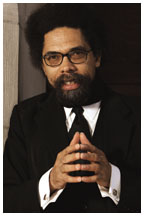 “One
of the joys and challenges of being a Christian is that we’re locked
into the love ethic — love thy neighbor. The first thing we have
to say is that we will not put up with a hatred or a demeaning or dehumanizing
of gay brothers and sisters.”
“One
of the joys and challenges of being a Christian is that we’re locked
into the love ethic — love thy neighbor. The first thing we have
to say is that we will not put up with a hatred or a demeaning or dehumanizing
of gay brothers and sisters.”
(Photo:
Office of Communications)
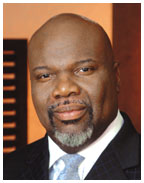 “I think there has been confusion between disagreeing and hating.
The church hasn’t spoken out about hate crimes, but we’ve
got to stop blaming the church because the government will not take a
stand.”
“I think there has been confusion between disagreeing and hating.
The church hasn’t spoken out about hate crimes, but we’ve
got to stop blaming the church because the government will not take a
stand.”
(Photo: Courtesy
Potter’s House)
Princeton professor Cornel West *80, top, and Bishop T.D. Jakes, evangelist
and pastor of The Potter’s House, a 30,000-member megachurch in
Dallas. The two participated in a conversation Oct. 26 on “Preachers,
Profits, and the Prophetic: The New Face of American Evangelicalism.”
![]()

FYI
— Findings
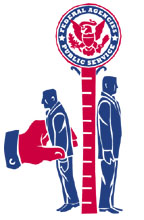 The
price of patronage
The
price of patronage
(Illustration: Steven Veach)
When managing federal agencies, executives who have made a career in
public service fare noticeably better than political appointees, according
to a recent study by David E. Lewis, assistant professor of politics and
public affairs. Lewis analyzed performance scores, determined by the Office
of Management and Budget, for 245 bureau chiefs who oversaw more than
600 federal programs. On a 100-point scale, the ratings for political
appointees were five to six points lower than those for career managers.
Measuring “good management” has limits, Lewis admits, but
the data indicate benefits from employing leaders with specific bureau
knowledge and experience in the public sector. The persistence of political
appointments, he writes, “suggests that presidents are willing to
trade management competence in order to secure ideological consistency
or loyalty and satisfy demands for patronage.” ![]()

Students had a new option in purchasing their textbooks for the fall
term: The U-Store carried digital versions of Environmental Economics
and eight other titles as part of a pilot project at 10 schools. Only
four digital textbooks were sold, according to marketing director Virginia
France, who said students preferred a book they could hold in their hands
and discovered that, unlike the paper versions, used e-books can’t
be returned for cash. ![]()

(John Jameson ’04/Office of Communications) |
The Princeton University Concert Jazz Ensemble and Jazz Ensemble II will give a concert in Richardson Auditorium in Alexander Hall, Saturday, Dec. 3 at 8 p.m. Saxophonist Ralph Bowen, a Princeton jazz faculty member, will be the guest conductor. Among the pieces on the program are original works by Canadian composer Phil Nimmons, a leading jazz musician and educator. Tickets are $15 and $5 for students.
Investigative journalist SEYMOUR HERSH will speak on “The War in Iraq: Bush’s Democracy and the Real Thing,” a Stafford Little Lecture, on Wednesday, Nov. 30, at 8 p.m. in McCosh 50.
Political activists, scholars, and journalists will participate in a conference hosted by the Woodrow Wilson School Dec. 1--3 on the rise of the MODERN CONSERVATIVE MOVEMENT over the past 40 years and its impact on America. The sessions will begin at 4 p.m. Dec. 1 and at 9 a.m. Dec. 2--3; all will be held in Dodds Auditorium in Robertson Hall. Among the speakers will be author Midge Decter; former National Review publisher William Rusher ’44, columnist George Will *68, and former Education Secretary William Bennett.
MICHAEL ERIC DYSON *93, Penn professor and subject of PAW’s Oct. 5 cover story, and EDDIE GLAUDE *97, associate professor of religion at Princeton, will speak on Tuesday, Dec. 6, at 4:30 p.m. on the topic, “Is Mike Dyson Right? Or Have the New Black Public Intellectuals Lost Their Minds?” The session will be held at 4:30 p.m. in Dodds Auditorium in Robertson Hall. Dyson is the author of “Is Bill Cosby Right? (Or Has the Black Middle Class Lost Its Mind?).”
T.R. REID ’66 will speak at an alumni symposium Saturday, Dec. 10, on the topic of his recent book, “The United States of Europe: The New Superpower and the End of American Supremacy.” Sessions will be held at the Friend Center from 9 a.m. to 1:30 p.m.; the $25 fee includes lunch. Other speakers include Robert L. Hutchings, diplomat in residence, and Skip Rankin ’72, a partner in the law firm of Baker & McKenzie.
For information and registration, call Kaitlin Lutz, 609-258-0014. ![]()

BEN BERNANKE, a former professor of economics and public affairs at Princeton, was nominated Oct. 24 by President George W. Bush to be the next chairman of the Federal Reserve Board. Bernanke, an expert on monetary economics, served on the Fed’s Board of Governors from 2002 to 2005 while on leave from the University. He resigned from Princeton in July after 20 years on the faculty and became chairman of the president’s Council of Economic Advisers.
Bernanke’s appointment drew support from former colleagues, including economics professor Alan Blinder ’67. “By virtue of his incredible knowledge of monetary theory and history, his honesty and integrity, his cool temperament, his attention to detail and his previous experience at the Fed,” Blinder said, “Ben Bernanke has all the ingredients to be a great Fed chairman.”
Princeton ranks in the bottom half of the Ivies in the percentage of MINORITIES IN ADMINISTRATIVE AND EXECUTIVE POSITIONS, according to a task force appointed by President Tilghman. The interim report found progress in paraprofessional and trade positions, but noted a need for a more visible University commitment to diversity, a broader pool of talented minority applicants, and an environment in which all employees can excel.
More than 100 students and alumni and 27 faculty
members signed an OPEN LETTER TO PRESIDENT TILGHMAN,
protesting a “trend” in inviting high-level government officials
to speak on campus. The letter singled out the presentation of the Crystal
Tiger Award last year to former Secretary of State Colin Powell and the
recent appearance of Secretary of State Condoleezza Rice at the Woodrow
Wilson School. “Alternative views are conspicuously absent from
the University’s guest lists,” the letter said. A Daily
Princetonian editorial took issue with the letter, citing “the
large number of recent lectures by individuals who are strongly critical
of administration policies.”
![]()

